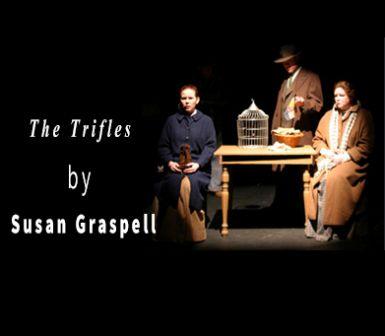The play Trifles by Susan Glaspell. It is a one-act play that explores themes of gender roles, the power of observation, and the subjective nature of truth.
The discrimination process in marriage that keeps one individual deprived from fundamental rights or he/she faces inequality regarding roles or responsibilities is called gender inequality.
Usually, females suffer more than males in this society for many reasons, for instance, women have to face dominant male culture, and it is assumed that due to her femininity she has to do all domestic chores
The Trifles by Susan Graspell
In another case, if a male is helping her woman, society considers it is abnormal or under pressure. The play by ‘Susan Graspell’, The Trifles and the story by ‘Shirley Jackson’, The Lottery discussed the issue of gender inequality in marriages. Writers in these plays portrayed female characters different as compared to male counterparts.
Trifles by Susan Graspell Analysis
The Trifles by Susan Graspell describes male and females role in the family and society as Mr and Mrs Hale, and Mr. & Mrs Peters. In this story, a character, Mrs Wright is blamed for sitting in the kitchen where there are dirty utensils.
On the other side, Shirley Jackson, in ‘The Lottery’ portrayed male and female characters, named as Mr Summer and Mrs Dunbar. Some activities shown in this story, in which females are not allowed to participate, such as the annual lottery. Both stories expose the male role in society and at family level while the part of women is also vivid.
The Trifles by Susan Graspell depicts the pleating role of a woman Mrs Wright, but Mr Hale wants her to do most of the other things, considering them as her responsibilities. Susan exposed through the play that kitchen chores are considered as the sole responsibility of females.
The story continues and describes the poor condition of Mr Wright’s kitchen that is located in the farm store. The story elaborates how females are not afraid to work in cold and summers.
It is clear from an example, ‘when Mr and Mrs Peter are going out to country’s attorney but Mrs Wright is in kitchen, as she has to do kitchen chores’.
Susan Graspell in the play also elaborates that how females are sincere with their males, as they represent them even in their absence. For instance, in play, at another place, Mrs Wright is in kitchen, holding her apron and ready to supply potatoes in town, is an act of her husband’s replacement. Contrarily, the character of the male depicted in ‘The Trifles’ and she elaborates that male does hard work and engages in farm activities.
Mr Wright is used to supplying his potatoes in the market of town on a regular basis. He is used to constructing and maintaining his store. Such examples are clear evidence that how male work in the society.
This notion also relates with the fact that Mr Wright blames her wife that she is even unable to clean the kitchen, but writer indicated that overall kitchen material was dirty as it was not the fault of Mrs Wright.
On the other hand, Shirley Jackson in the story, ‘Lottery’ described male and female chores and their responsibilities in daily life. She also elaborates on same grounds, the kitchen duties of females as well as the substitution of their husbands when they are not around.
In an event, Mrs Hutchinson decided to leave home late for the lottery, as she could not leave kitchen sink dirty. In the play, Mrs Dunbar also acts as Mr Dunbar, i.e. intend to perform his responsibilities.
Gender Inequality in Society
The accurate depiction of males in these stories elaborates that men have to participate in societal activities, traditional events, and they also have to lead their families while they want homestead clean too.
The lottery process is leading by Mr Summer, Shirley Jackson, in her story depicts the role of Mr Hutchinson as cutting trees and weeds from compounds with his wife, before leaving out for lottery function. This notion of character is similar to that of cleaning utensils in the kitchen.
Contrarily, Shirley Jackson, in the story, ‘Lottery’ depicts a critical thinking person as compared to Susan’s play ‘The Trifles’. It is clear that Miss Tessie condemns the lottery tradition and provides an example of an era when such practices were prohibited as it was against the human race.
However, the old man complains that such reigns were stupid by abandoning lottery practices as he was participating by seventy-seventh time in it.
In an event, Mr Summer questions Mrs Dunbar in a stealing activity when a woman represented her husband in picking the papers for lottery from the black box. The role of men participating societal activities is evident from the act of Mr Summer who was questioning Mrs Dunbar by representing her husband.
In the society, gender inequality in marriage is very common. It is epidemic in the US and different Western Countries. Gender equality law confronts violation even after divorce and male suppress female through several actions.
Usually, in families, gender inequality is prevalent in decision making, when only men are allowed to take decision and women is deprived. In many governmental positions, this scenario has occurred where females are allowed to sit in the top places.
However, latest research shows that women involved in doing domestic chores, and handle home issues, even when both partners work at distant places from home. Also, in this society, it is only women, who bear home responsibility, raise kids, takes their care and handle their education matters.
Men are reluctant in doing these things and do not want to face any challenges, even sit back and offer no help. Therefore, it is clear that women responsibility from calming down her little kids from crying to their educational needs is enormous, and men often do not participate helping women, considering it the sole duty of women.
Gender inequality in marriages is a growing challenge. It is not new as its roots are deep down in society. Several research studies have shown a reduction in this trend due to awareness and education, but in most less developed societies, the pattern is same.
Women discrimination from various aspects is prevalent, and this practice does not seem to end.
Females are overloaded with domestic chores as well as some do their jobs. It is conclusive that females are equal counterparts to males and the sole responsibility of home on women is not a justified idea. The Trifles by Susan Graspell portrayed the concept in an interesting way.
To overcome such situation, both will have to work together and realize each other’s comfort to reduce such disparities.
Themes:
- Gender Roles and Oppression: The play Trifles by Susan Glaspell sheds light on the oppressive nature of traditional gender roles and the marginalization of women in early 20th-century society. The play presents a stark contrast between the male and female characters. The men dismiss the women’s concerns and belittle their domestic interests as insignificant “trifles.” The women, on the other hand, draw on their unique understanding of the female experience to uncover vital clues and solve the mystery. The play highlights the subtle forms of oppression experienced by women and the strength they derive from their shared experiences.
- Perception and Observation: “Trifles” underscores the power of observation and the significance of seemingly insignificant details. The women, Mrs. Hale and Mrs. Peters, notice small clues in the house that the men overlook due to their preconceived notions and biases. Through their attention to detail and empathy, the women uncover the truth about the crime. The play explores the idea that truth can be subjective and that a deeper understanding of people and their experiences requires careful observation and empathy.
- Justice and Morality: The play raises questions about justice and the morality of taking the law into one’s own hands. As the women uncover evidence suggesting the motive for the crime, they are faced with a moral dilemma. They must decide whether to reveal the evidence, which may lead to a conviction, or protect Minnie Wright, who they believe was driven to commit the crime due to her oppressive circumstances. The play challenges conventional notions of justice and invites the audience to consider the complexities of morality and empathy.
- Isolation and Loneliness: Trifles by Susan Glaspell explores the theme of isolation and its impact on individuals. Minnie Wright, the accused woman, is depicted as a lonely and isolated figure. The play suggests that her isolation contributes to her deteriorating mental state and eventual act of violence. The theme of isolation extends to the other characters as well, highlighting the emotional and social consequences of neglecting human connection.
- Female Solidarity and Empowerment: “Trifles” celebrates the power of female solidarity and the strength that can be derived from shared experiences. The bond between Mrs. Hale and Mrs. Peters deepens as they uncover the truth and make a decision that challenges the oppressive male-dominated society. The play highlights the importance of empathy, understanding, and support among women in the face of adversity.
Overall, “Trifles” is a thought-provoking play that tackles issues of gender, justice, and human connection. Through its exploration of these themes, it challenges societal norms and sheds light on the experiences of women in early 20th-century America.

